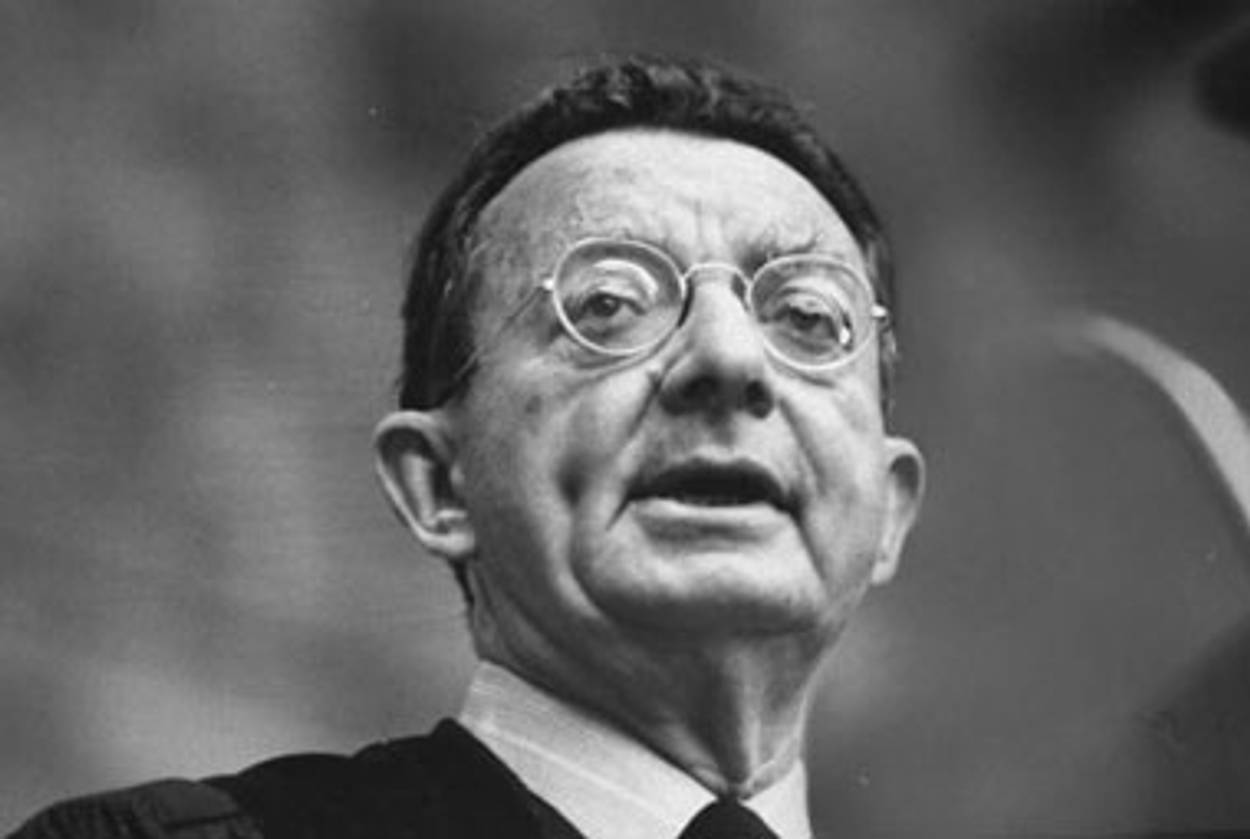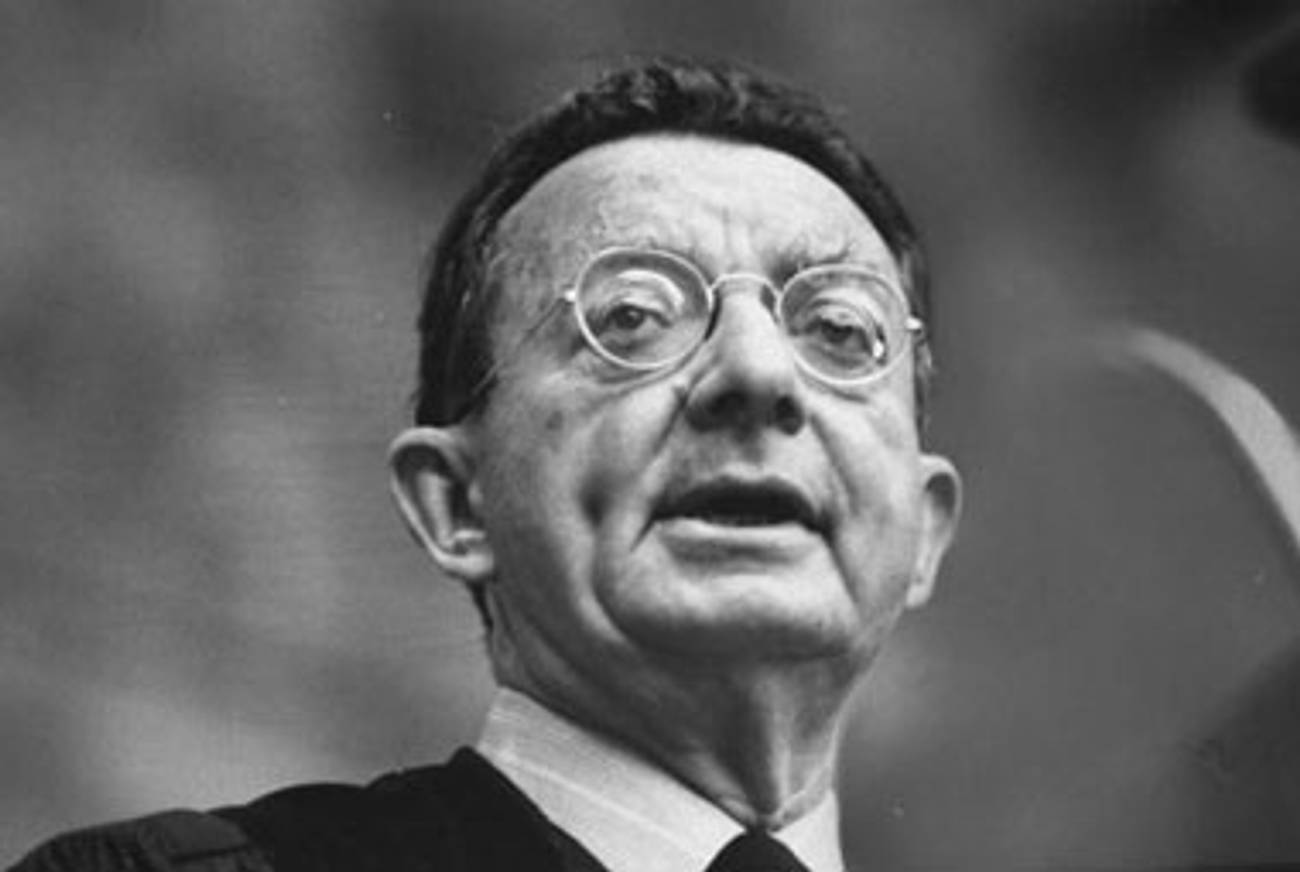Mixed Record
I.F. Stone was prescient on Zionism, less so on Communism




Today, the farther you travel on the political left, the less likely you are to find support for the State of Israel. Especially in Europe, but increasingly in America as well, there is a feeling on the left that it is not simply the policies of Israeli governments that are objectionable—not just the occupation of the West Bank, the treatment of Palestinians, or the building of settlements, all of which are the objects of vigorous criticism from many Israelis themselves—but the very existence of Israel as a Jewish state. For critics like Tony Judt or Daniel Lazare, who have called for a “one-state solution” to the Arab-Jewish conflict, it is impossible to reconcile the idea of Jewish nationhood with the values of universalism.
Reading American Radical: The Life and Times of I.F. Stone, the new biography by D.D. Guttenplan, is a reminder of how different things used to be. Stone, a radical journalist who for two decades published a one-man newsletter, I.F. Stone’s Weekly, is something like a saint of the American left; from the 1930s through the 1970s, he could be found voicing the extreme-left line on every issue from the New Deal to the Vietnam War. Yet to many American Jewish readers who never saw a copy of the Weekly, I.F. Stone was known as an outspoken Zionist. In late 1945, when Stone arrived in Palestine to cover the mounting conflict between the British, the Jews, and the Arabs, he gave heartfelt support to the Zionist project: “It is the one place in the world where Jews seem completely unafraid…. In Palestine a Jew can be a Jew. Period. Without apologies, without any lengthy arguments as to whether Jews are a race, a religion, a myth, or an accident. He need explain to no one, and he feels profoundly at home; I am willing to attribute this to historic sentimentality but it remains nonetheless a tremendous and inescapable fact.”
Indeed, as Guttenplan shows, Stone was more than a reporter on Palestine; he actively assisted the “Aliyah Bet,” the illegal immigration of European Jewish refugees to Palestine, at a time when the British were still blocking Jewish settlement. In April 1946, Stone went to Europe and traveled with Jewish DPs leaving Germany for Palestine. When the refugees were about to board a ship at Savona, in Italy, they were suddenly stopped by policemen; Stone bought time by waving his State Department press ID and insisting that he not be interfered with. Yehuda Arazi, a Haganah agent helping to smuggle refugees, played along by telling the Italian police “that in America there are two important people, Truman and Stone, and that if the Italians don’t treat us well then Stone will make a big fuss.” The ruse worked: while Stone played for time, the refugees’ ship was able to set sail for Palestine.
Stone’s book based on his adventures, Underground to Palestine, was dedicated to “those anonymous heroes, the Shelikhim [emissaries] of the Haganah,” and he donated much of the profits to their cause. All this creates a slight embarrassment for Guttenplan: how to reconcile Stone’s Zionism with the anti-Zionist consensus on the contemporary left? Guttenplan’s strategy is to dwell on Stone’s consistent, outspoken concern for the Palestinians. Before 1948, Stone advocated a binational state; after 1967, he called for the establishment of a Palestinian state in the occupied territories. Israel should “make a virtue of necessity,” he wrote, “by offering to set up an Arab state in these areas, linked in a confederation with Israel and perhaps also with Transjordan. Why not do it with grace and magnanimity instead of grudgingly and in this context provide reparation and settlement?” In this Stone was prescient, but as Guttenplan notes, he was writing out of concern for Israel’s survival: “Stone himself made no pretense to objectivity.” It is noteworthy that this sort of liberal Zionist argument, calling for a two-state solution, is exactly what much of the contemporary left disdains.
Yet American Radical is, on the whole, Guttenplan’s attempt to redeem Stone, and by extension the left of his era, from the criticism and neglect of posterity. As Guttenplan writes in his introduction, by the time Stone died, at the age of 81 in 1989, he had become something of an institution, and his obituaries praised him as a cantankerous individualist, “a journalist’s journalist.” But as Guttenplan’s title suggests, this sort of nonpartisan, noncommittal honor is not what he desires for Stone. Rather, Guttenplan writes, it is “the radical I.F. Stone who has at least as much to teach us as the patron saint of investigative reporting…. Shorn of its political engagements, Stone’s career is reduced to a kind of performance, like a veteran ballplayer or a distinguished actor.”
What this means in practice is that Guttenplan’s “life and times” of Stone devotes a good deal more space to the times than to the life, becoming in effect a history of the American left in the 20th century. About Stone’s personality and private life we learn little, possibly because there is little to learn: he was wholly immersed in the public events of his day, leaving little time for private or family life. Born Isadore Feinstein in 1907, he spent most of his childhood in the Philadelphia area, where his immigrant parents ran a department store in Haddonfield. He was a dedicated journalist from the age of 14, when he took advantage of his father’s absence on a business trip to start publishing a newspaper, called Progress, out of the family home.
He dropped out of the University of Pennsylvania to work as a full-time journalist, and by 1933 he was at the New York Post—then a crusading liberal paper, where Stone wrote pro-New Deal editorials. He would go on to write for the legendary PM and The Nation, among other liberal publications, before the rise of McCarthyism made him unemployable, leading him to found the Weekly. Along the way, in 1937, he changed his name to the less Jewish-sounding I.F. Stone—as Guttenplan points out, a common thing to do among Jews of Stone’s generation. At least he didn’t stick with his first attempted pseudonyms, Geoffrey Stone or, still worse, Abelard Stone. To his friends, he remained Izzy, though he bridled when his political enemies made insinuations about his name-change.
Guttenplan makes no bones about the fact that those friends were often Communists. Indeed, as his liberal and conservative critics continue to point out even today, Stone was consistently attracted by Communism, both at home and abroad—a fellow traveler of the Soviet Union and the CPUSA in the 1930s, an admirer of Castro and Ho Chi Minh. Just as Guttenplan’s biography, two decades in the making, arrived in bookstores, another book—Spies by John Earl Haynes, Harvey Klehr, and Alexander Vassiliev—claimed to show, based on evidence from the KGB archives, that in 1936-38 Stone actively cooperated with Soviet agents in America, passing on information and helping to recruit other sympathizers.
Guttenplan vigorously disputes the charge that Stone was a KGB spy, but not because he is especially disturbed by what it might say about Stone’s ideological commitments. A large part of Stone’s authority came from his complete independence—I.F. Stone’s Weekly was a one-man operation, funded wholly by subscriptions—and that authority would be compromised if it turned out that he were taking orders from Moscow. “A journalist who accepts a hidden subsidy from a foreign power betrays not his country but his readers,” Guttenplan writes, and he is highly critical of the liberal anti-Communist journal Encounter, which accepted CIA funding.
But he is not at all disturbed that, in the 1930s and subsequently, Stone’s views usually coincided with Moscow’s, or Havana’s, or Hanoi’s. In 1937, the Moscow show trials, with their unmistakable revelation that the USSR was a totalitarian dictatorship and Stalin a paranoid tyrant, led many American leftists to abandon their admiration of the USSR. Stone, on the other hand, wrote that “revolutions do not take place according to Emily Post. The birth of a new social order, like the birth of a human being, is a painful process.” In 1959, when he went to Havana to meet Castro’s revolutionaries, he told readers of the Weekly that Castro was “pragmatic rather than doctrinaire. In this he strongly resembles Franklin D. Roosevelt,” and, rather more romantically, that Che “was the first man I had ever met whom I thought not just handsome but beautiful…a cross between a faun and a Sunday School print of Jesus.” In 1967, he was rooting for a Viet Cong victory in Vietnam, on the grounds that it would be a rebuke to “everything America stands for”—by which he meant “Boeing and General Electric and Goodyear and General Dynamics.”
Guttenplan quotes all of these damning tributes from I.F. Stone to the Communist dictator of the moment, which by themselves constitute a complete demolition of Stone’s claim to political judgment. Yet he quotes them, not to bury Stone, but to praise him: he was, Guttenplan sums up, “an independent radical who kept hold of his ideals and kept faith with his comrades, without renouncing his freedom to speak his mind.” To any fair-minded reader, however, what Guttenplan’s book shows is how badly Stone chose his comrades, and how easy it is to mix up true ideals with dangerous and damaging illusions. There were many writers of Stone’s era who managed to be liberals without being Communists, and who understood how complex and challenging a creed liberalism really is. Guttenplan has great contempt for such liberal anti-Communists, seeing them as trimmers and hypocrites; but history has shown that it is to them, not to Stone, that we should look for inspiration.
Adam Kirsch is a contributing editor to Tablet Magazine and the author of Benjamin Disraeli, a biography in the Nextbook Press Jewish Encounters book series.
Adam Kirsch is a poet and literary critic, whose books include The People and the Books: 18 Classics of Jewish Literature.
Adam Kirsch is a poet and literary critic, whose books include The People and the Books: 18 Classics of Jewish Literature.